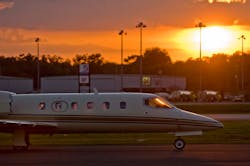Clearing the Air About Exclusive Rights at Airports
According to Federal Grant Assurance 23, the owner or operator of any airport that has been developed or improved with federal grant assistance is required to operate the airport for the use and benefit of the public. This includes making it available for all types, kinds and classes of aeronautical activity, as well as ensuring that any person or entity is not granted the exclusive right to conduct aeronautical activities at the airport.
The Federal Aviation Administration (FAA) defines an exclusive right as a power, privilege or right excluding or debarring another from exercising a like power, privilege or right. An exclusive right can be conferred either by express agreement, by the imposition of unreasonable standards or requirements, or by any other means. This applies to a wide range of aeronautical activities including charter flights, pilot training, aircraft rental and sightseeing, aerial photography, aircraft sales and services, and sale of aviation petroleum products.
The intent of the prohibition on exclusive rights, per FAA Advisory Circular AC 150/5190-5, is to promote fair competition at federally-obligated, public use airports for the benefit of aeronautical users. The existence of an exclusive right at an airport is considered to limit the usefulness of the airport and deprive the public of the benefits that flow from competition.
However, an exception to this general rule is that an airport sponsor may elect to provide any or all aeronautical services to the public. While most airport sponsors recognize that aeronautical services are best provided by profit-driven private enterprises, there are situations where the public or private owner of an airport opts to perform the aeronautical activity itself in order to become financially self-sustaining.
This raises a central question. Can an airport sponsor grant itself the exclusive right to operate a single fixed-based operator (FBO) in a manner that benefits the public, guarantees a level playing field and is economically viable?
Grant Assurance 23 provides clear guidance for airports having a privately-operated, single aeronautical service provider. The providing of services by a single FBO shall not be construed as an exclusive right if both of the following apply:
- It would be unreasonably costly, burdensome or impractical for more than one FBO to provide such services
- If allowing more than one FBO to provide such services would require the reduction of space leased pursuant to an existing agreement between the single FBO and the airport
The fact that a single business may provide most or all on-airport aeronautical services is not, in itself, evidence of an exclusive rights violation. What is an exclusive rights violation is the denial by the airport sponsor to afford other qualified parties an opportunity to be an on-airport aeronautical service provider. While the airport sponsor may allow qualified parties to compete for the right to be an on-airport service provider, it is not required to accept all qualified parties without limitation. Also, the fact that only one entity pursued an opportunity in a competitive offering would not subject the airport sponsor to an exclusive rights violation.However, the airport sponsor cannot, in any circumstance, choose to have only one FBO provide services at the airport as a matter of convenience.
Single-FBO airport sponsors face two sources of controversy. First, they must determine whether or not a potential competitor is reasonably qualified in terms of safety and efficiency –which ultimately falls under the jurisdiction of the FAA. Second, the airport sponsor may appear to place unreasonable restrictions on an entity seeking to compete with an airport’s existing aeronautical service providers.
Notably, when the owner of a public-use airport elects to exclusively provide any or all aeronautical services, the same rules do not apply. In this situation, the airport sponsor is simply required to use its own employees and resources. This means it cannot exercise a proprietary exclusive right to operate the airport’s single FBO through a management contract. There may also be situations where an airport sponsor chooses to perform an aeronautical activity due to its revenue potential, such as aircraft fueling. However, aircraft owners may exercise their right to install fuel systems, self-fuel or obtain fuel at a lower price off the airport providing they comply with reasonable regulations and standards. In such cases, the airport sponsor’s exclusive right may limit its ability to generate revenue and provide healthy competition.
When an airport sponsor elects to provide any or all of the aeronautical services at an airport, such as a single FBO, it should adhere to the same FAA policies imposed upon profit-motivated private enterprises providing aeronautical services to the public. Federal Grant Assurance 23 specifically provides that a federally obligated airport promote fair competition for the benefit of aeronautical users. Anything less not only betrays the public trust, but threatens the airport’s future economic health.
Curt Castagna, president and CEO of Aeroplex/Aerolease Group, is a member of the Los Angeles County Airport Commission, president of the Van Nuys and Long Beach Airport Associations, and board chair of the National Air Transportation Association. A certified private and instrument-rated pilot, he has instructed courses in aviation administration at Cal State Los Angeles for over two decades.
About the Author

Curt Castagna
President and CEO
Curt Castagna, President/CEO of Ascension Group Partners, serves as president and CEO of the National Air Transportation Association, member and past chair of the Los Angeles County Airport Commission, and president of the Van Nuys and Long Beach airport associations. A certified private, seaplane and instrument-rated pilot, he continues to instruct courses in aviation administration at Cypress Community College and Cal State Los Angeles.
